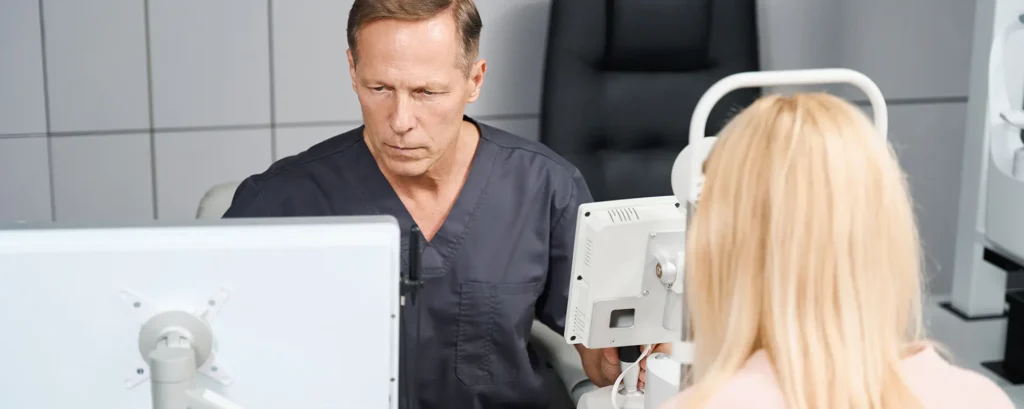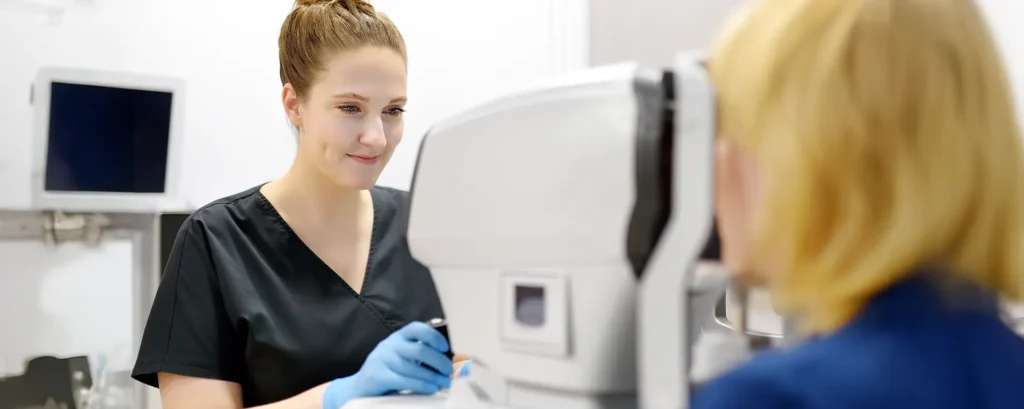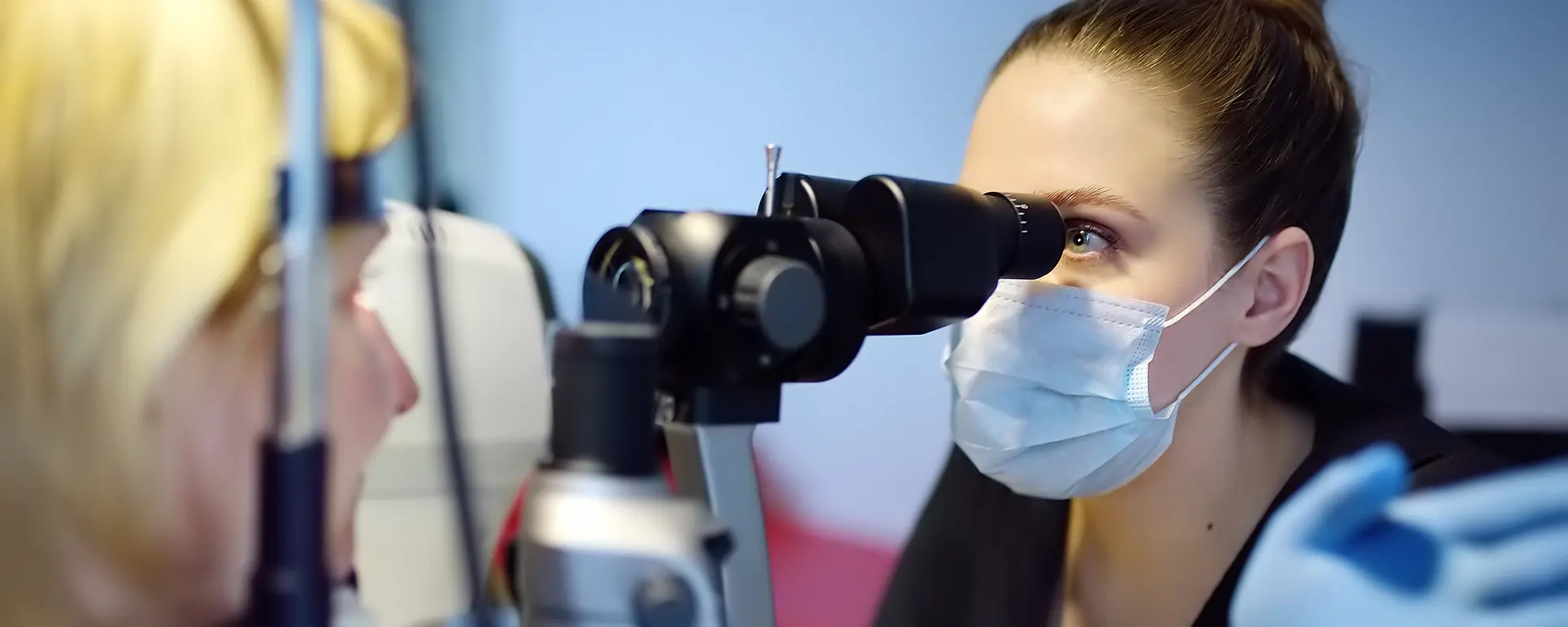If you are preparing for cataract surgery on the NHS, one of the most important decisions you will face is what type of lens implant you will receive. Cataract surgery is the most commonly performed operation in the UK, and its success rate is extremely high. The procedure itself is usually straightforward, but the choice of intraocular lens (IOL) – the artificial lens that replaces your cloudy natural one – will influence your long-term vision and whether you still need glasses afterwards.
The NHS provides excellent cataract care, but its offering is limited when it comes to lens options. Most patients are offered a standard monofocal lens, which restores clear vision at one set distance but usually requires glasses for reading or intermediate tasks. Understandably, many people want to know if alternatives such as multifocal, trifocal, toric, or other “premium” lenses are available through the NHS.
This article will guide you through what the NHS typically provides, why your choices may be restricted, and in what situations private cataract surgery could give you more flexibility. By the end, you’ll have a clear picture of what to expect – and whether exploring alternatives might make sense for you.
What Types of Lenses Are Available on the NHS?
The NHS primarily offers monofocal lenses. These lenses focus at one distance, usually set for clear vision at far range. This means you will see well for tasks such as driving, watching TV, or recognising faces. However, you will almost certainly need reading glasses for close-up work such as reading, using a smartphone, or sewing.
Some NHS hospitals do offer limited customisation within monofocal lenses. For example, you may be able to choose whether your lens is set for distance or for near vision. In some cases, surgeons use a strategy called “monovision”, where one eye is corrected for distance and the other for near, to reduce your dependence on glasses. However, this is not suitable for everyone, and the NHS cannot always provide the detailed testing and trial lenses needed to ensure you are comfortable with this option.
The NHS does not routinely provide multifocal, trifocal, or extended depth of focus (EDOF) lenses. It also does not usually offer toric lenses for astigmatism, unless there is a very specific medical justification. This is because the NHS works to provide safe, effective treatment to all patients, but within strict cost and resource frameworks. Premium lenses are more expensive and require more detailed patient counselling and follow-up, which is difficult to support within a publicly funded service.
Why Are NHS Lens Options Limited?

The NHS has a responsibility to provide care that is both clinically effective and cost-efficient. Cataract surgery is carried out on hundreds of thousands of patients each year, so decisions about which lenses are routinely provided are made at a system-wide level. The goal is to ensure that every patient has safe surgery, a reliable visual outcome, and good quality of life.
Monofocal lenses meet these criteria very well. They are reliable, widely tested, and associated with excellent long-term results. Complications such as glare and halos are less common compared with premium lenses. By sticking to monofocal lenses, the NHS can deliver consistent results across a very large patient population.
Premium lenses, while appealing, are not always suitable for everyone. For example, multifocal or trifocal lenses can increase the risk of visual side effects such as glare at night or reduced contrast sensitivity. They also demand very precise surgery and detailed preoperative assessment to ensure good outcomes. Providing this level of customisation for every patient on the NHS would significantly increase costs and waiting times, which is why it is not part of standard care.
Monofocal Lenses: The Standard NHS Choice
Monofocal lenses have been used for decades, and their track record is excellent. With these lenses, you can expect very clear vision at your chosen focal point. If your surgeon sets your lenses for distance vision, you will likely need reading glasses. If they are set for near vision, you may need glasses for driving and distance work.
One advantage of monofocal lenses is their simplicity. They are predictable and stable, which makes them especially safe in patients who may have other eye conditions such as macular degeneration, glaucoma, or diabetic retinopathy. These conditions may reduce the effectiveness of premium lenses, so in many cases a monofocal lens is the most sensible option anyway.
While monofocal lenses do not offer the “glasses-free” lifestyle that many people hope for, they provide excellent clarity and allow the NHS to deliver surgery to a high volume of patients without compromising outcomes.
Multifocal and Trifocal Lenses: Why They’re Not on the NHS
Multifocal and trifocal lenses are designed to reduce your dependence on glasses. They split light into multiple focal points, so you can see at different distances without needing spectacles. For example, a trifocal lens gives you distance, intermediate, and near vision.
The benefits are clear: many patients with these lenses enjoy greater freedom from glasses. However, they are not without trade-offs. Side effects such as glare, halos around lights at night, and reduced contrast sensitivity are more common. These issues can be particularly troublesome for people who drive at night or who have certain eye conditions.
On the NHS, the balance of benefit versus risk has not justified routine use of these lenses. Since cataract surgery is primarily about restoring safe, functional vision, monofocal lenses are considered the most reliable option. If you want multifocal or trifocal lenses, this is something you would usually need to explore privately.
Toric Lenses: What About Astigmatism?
Astigmatism occurs when the cornea is shaped more like a rugby ball than a football, causing blurred or distorted vision. A toric lens can correct this, often reducing the need for glasses after surgery.
On the NHS, toric lenses are not generally offered unless there is a significant medical need. Instead, you will likely receive a standard monofocal lens, and any residual astigmatism will be corrected with glasses.
Privately, toric lenses are more readily available. If you have moderate to high astigmatism, this could be an important factor in whether you decide to stay with NHS treatment or consider private options.
Extended Depth of Focus (EDOF) Lenses: Another Premium Option
EDOF lenses are designed to provide a continuous range of vision, especially at intermediate distances such as computer work. They do not usually give as sharp near vision as trifocal lenses, but they can be a good compromise for people who want spectacle independence without as many visual side effects.
These lenses are not offered on the NHS. Like other premium lenses, they require more advanced surgical planning and come with additional costs that the NHS cannot cover for routine cases. If this is a priority for you, private cataract surgery would be the only way to access this technology.
When Should You Consider Private Cataract Surgery?

If you are happy to use glasses after your NHS surgery, then a standard monofocal lens will serve you well. However, if you want to reduce your dependence on glasses, correct astigmatism at the same time, or explore advanced lens technology, you will need to look at private cataract surgery.
Private surgery gives you more choice, more detailed preoperative testing, and the ability to discuss premium options such as multifocal, trifocal, toric, or EDOF lenses. The cost is higher, but for some patients the benefits – particularly in lifestyle terms – make it worthwhile.
Balancing NHS Care and Private Options
Many patients find themselves weighing up whether to stay with the NHS or move privately. The NHS provides safe, effective care with excellent outcomes, but limited choice. Private care offers more flexibility, but at a cost. There is no right or wrong decision – it depends on your priorities, lifestyle, and budget.
FAQs

1. What type of lens will I get on the NHS?
On the NHS, almost all patients are offered a monofocal intraocular lens. This means your new artificial lens is set to focus at a single distance, usually for clear distance vision. It gives excellent clarity for everyday activities such as driving or watching TV, but you’ll almost certainly still need glasses for near tasks like reading, using your phone, or doing detailed work. Some patients prefer to set their monofocal lens for near vision instead, though this means they will need glasses for distance. Overall, monofocal lenses are a safe, reliable, and proven choice.
2. Can I choose a multifocal lens on the NHS?
Unfortunately, multifocal lenses are not routinely available on the NHS. These lenses are considered premium options because they provide more than one focal point, reducing your need for glasses. However, they also come with higher costs, more complex assessments, and potential visual side effects like glare and halos, which the NHS does not routinely fund. If you’re interested in multifocal or trifocal technology, you would need to consider private cataract surgery, where these lenses are more widely offered.
3. Does the NHS offer toric lenses for astigmatism?
Toric lenses, which correct astigmatism directly during cataract surgery, are not usually offered on the NHS. Instead, the standard approach is to use a monofocal lens and then prescribe glasses afterwards to correct any residual astigmatism. In some rare cases where astigmatism is very severe and impacts surgical safety or vision outcomes, an NHS team may make an exception, but this is not common. If you want astigmatism correction built into your lens, this is generally only possible through private surgery.
4. What is monovision and is it available on the NHS?
Monovision is when one eye is corrected for distance and the other for near vision, which can reduce your reliance on glasses. While it is sometimes available on the NHS, it is not routinely offered everywhere because it requires careful assessment to ensure you will tolerate the difference between your eyes. Some people adapt very well and enjoy greater spectacle independence, while others find the imbalance uncomfortable. If this interests you, it’s worth discussing with your NHS surgeon, though more detailed testing is usually only possible in private clinics.
5. Are premium lenses better than NHS monofocal lenses?
Premium lenses such as multifocal, trifocal, toric, or extended depth of focus (EDOF) lenses can be attractive because they reduce the need for glasses. However, they are not automatically “better” than monofocal lenses. They carry a higher chance of side effects like glare, halos, and reduced contrast sensitivity, and they demand very precise surgery. Monofocal lenses, in contrast, are extremely predictable, safe, and reliable for all patients, including those with other eye conditions. For this reason, the NHS sticks to monofocal lenses, while premium ones are best explored privately if you are motivated by spectacle independence.
6. Will I need glasses after NHS cataract surgery?
Yes, in most cases you will still need glasses after cataract surgery on the NHS. Your new monofocal lenses will give you clear vision at one distance, but not across the full range. That means if your lenses are set for distance, you’ll likely need reading glasses for books, smartphones, and close-up tasks. If they’re set for near vision, you’ll probably need distance glasses for driving or TV. Some patients manage with a compromise such as monovision, but most people still use spectacles regularly.
7. Can I pay extra for a premium lens within the NHS?
At present, the NHS does not allow a “top-up” system where you pay extra just for a premium lens. If you are receiving cataract surgery through the NHS, the standard monofocal lens is the only option. If you want access to multifocal, trifocal, toric, or EDOF lenses, you would need to have the whole procedure carried out privately. This is an important distinction, as some patients assume they can upgrade while still using NHS surgery – but unfortunately, that is not how the system works.
8. Are NHS outcomes worse than private cataract surgery?
No – the safety and effectiveness of NHS cataract surgery is excellent. The main difference is not in the surgical skill or quality of outcomes but in the range of lens options offered. NHS patients typically achieve very clear vision, just with the expectation that they will need glasses afterwards. Private surgery gives you more lens choice and more time for tailored preoperative testing, but the NHS remains one of the most successful cataract programmes in the world.
9. How do I know if private cataract surgery is worth it for me?
The decision depends on your lifestyle, priorities, and budget. If you are comfortable wearing glasses and your main goal is simply to restore safe and clear vision, then NHS surgery will give you exactly that. If, however, you are keen to reduce your reliance on spectacles, want astigmatism correction at the same time, or are attracted to new lens technologies, then private surgery may be worthwhile. It’s a personal choice, and often comes down to whether the convenience of glasses independence is worth the extra investment.
10. What should I do if I want premium lenses?
If you are certain that you want premium lenses, the next step is to arrange a consultation at a private eye clinic. There, your eyes will be tested in greater detail, including corneal scans and lifestyle assessments, to see which lens option is most suitable. You’ll also have a chance to discuss the potential benefits and side effects in more depth. Once you understand your options, you can make an informed decision about whether to go ahead privately or remain with the NHS.
Final Thoughts
NHS cataract surgery remains one of the most successful medical interventions offered in the UK. With standard monofocal lenses, you can expect safe surgery, a reliable outcome, and a major improvement in your quality of life. The trade-off is that you will almost certainly still need glasses, because premium options such as multifocal, trifocal, toric, and extended depth of focus lenses are not routinely available through the NHS.
For many patients, this is perfectly acceptable. Restoring clear vision is the main priority, and NHS cataract surgery delivers this consistently. However, if you are keen to reduce your reliance on glasses or if you have specific visual needs such as astigmatism correction, private surgery gives you more flexibility in choosing the right lens technology.
At London Cataract Centre, we provide the full range of lens options, including premium choices that are not offered by the NHS. If you are weighing up the differences, we can help you understand what each option means for your vision and lifestyle.
Ultimately, the right path depends on your personal priorities. Whether you decide to stay with NHS care or explore private treatment, knowing what lens options are available – and what isn’t – will help you make an informed decision that fits your needs.

